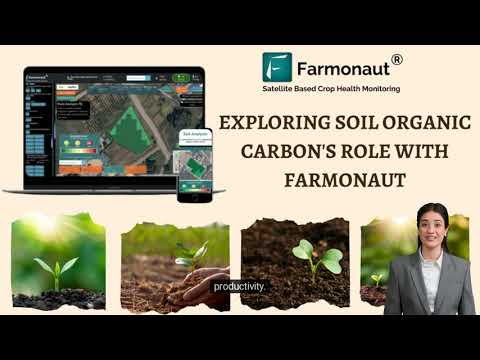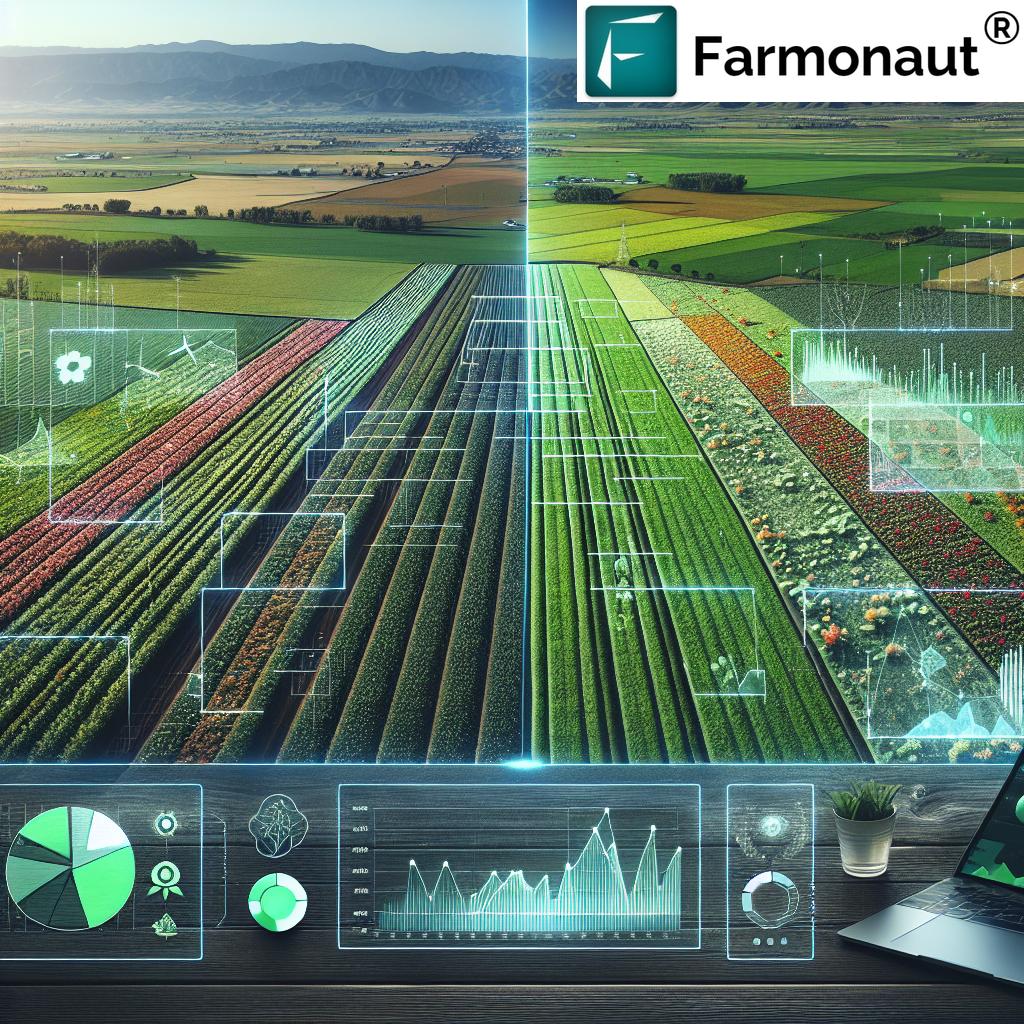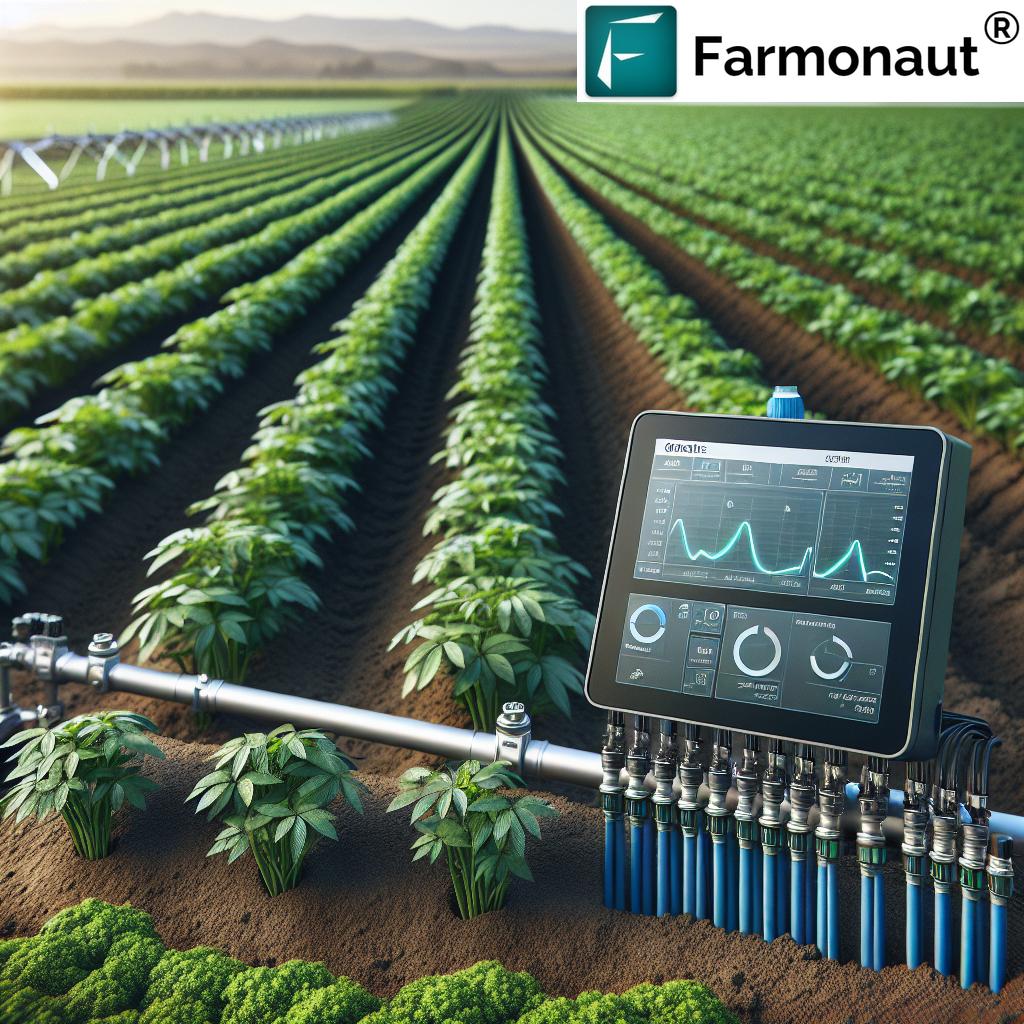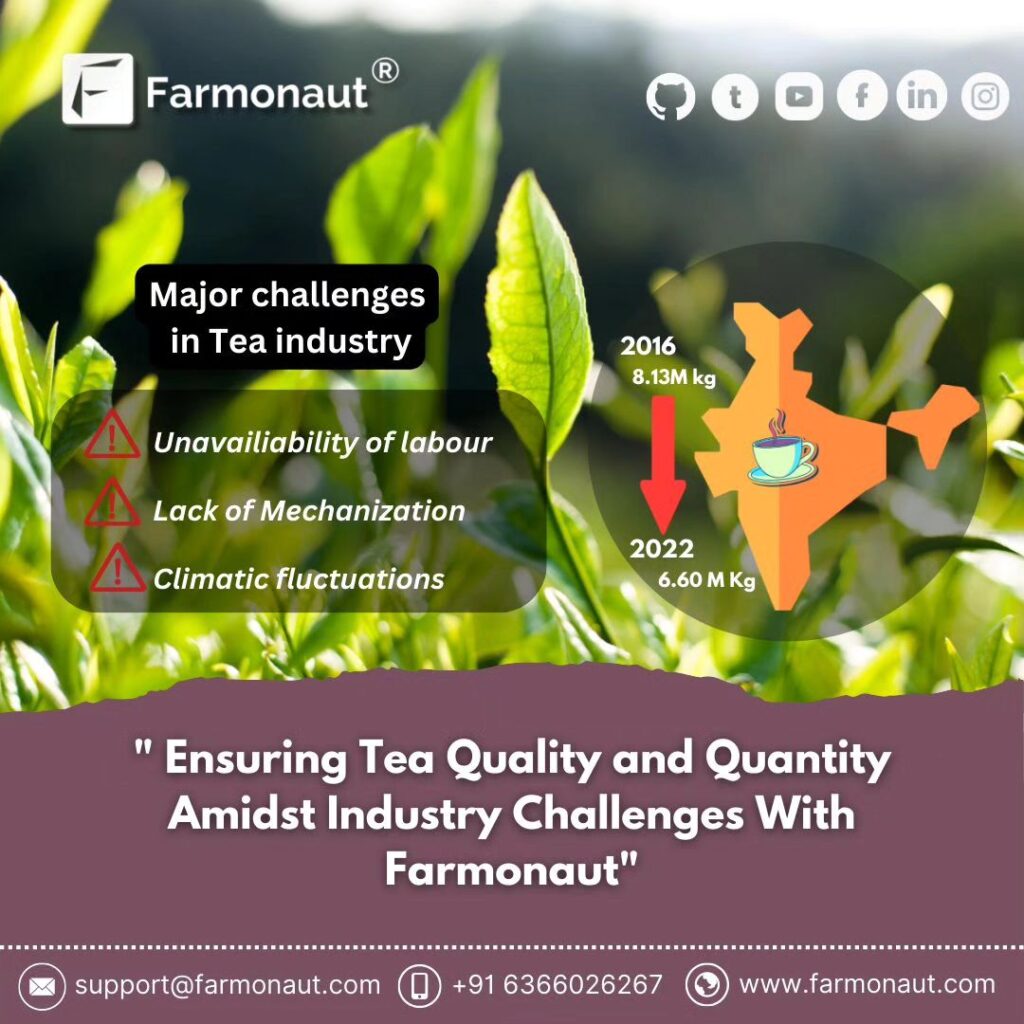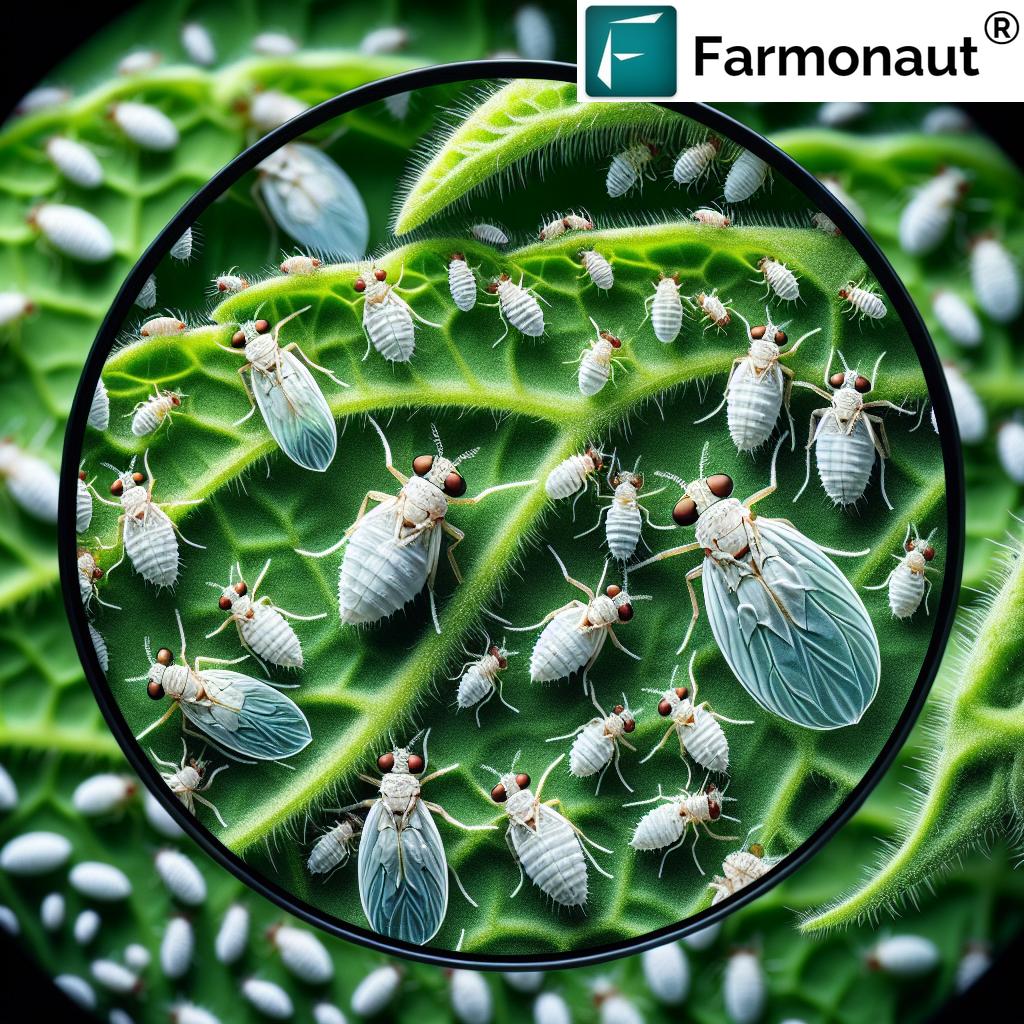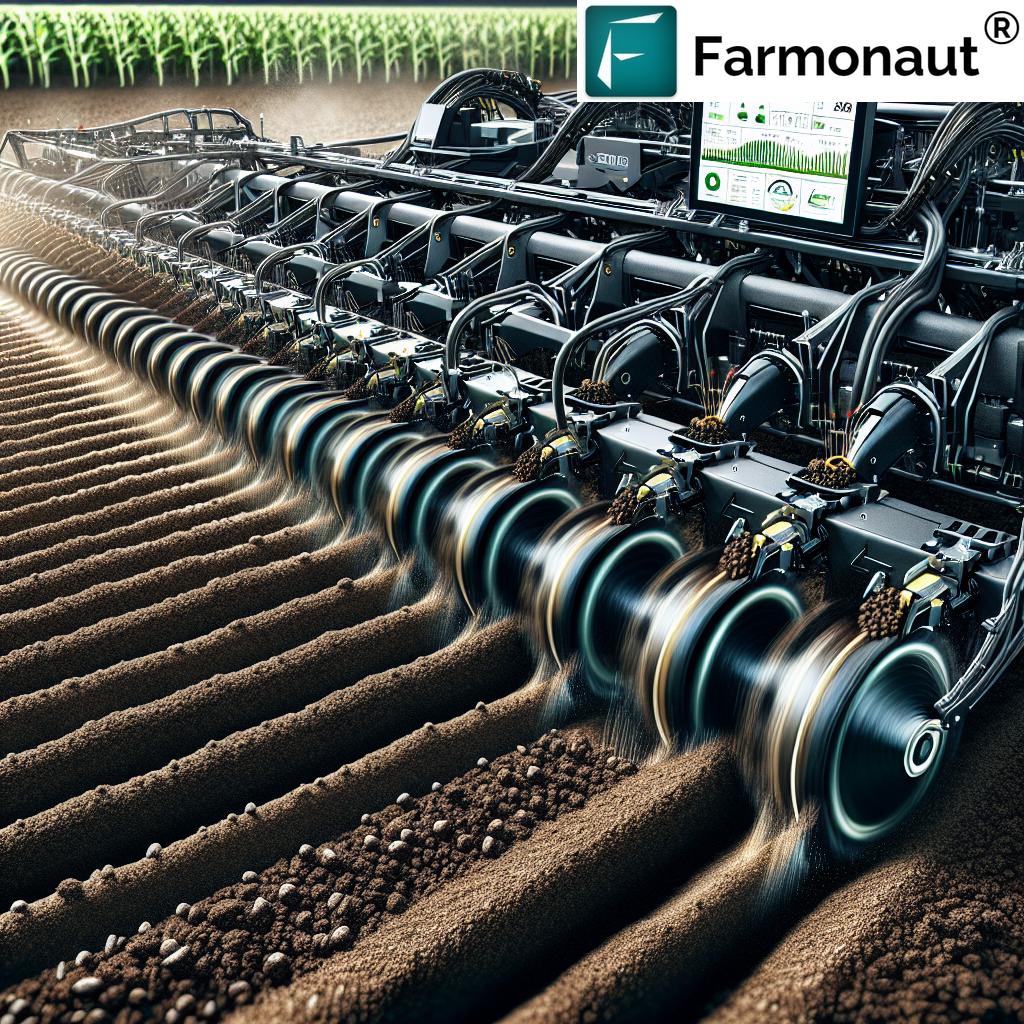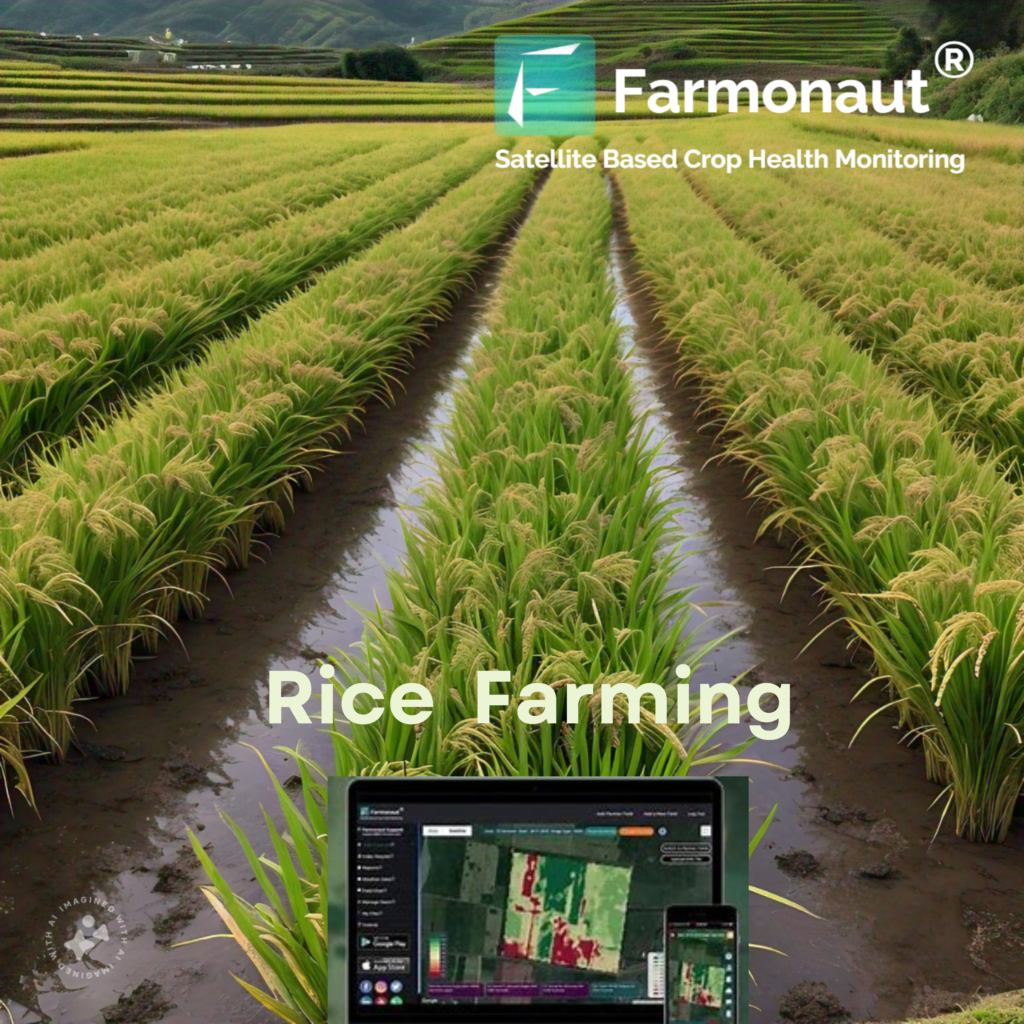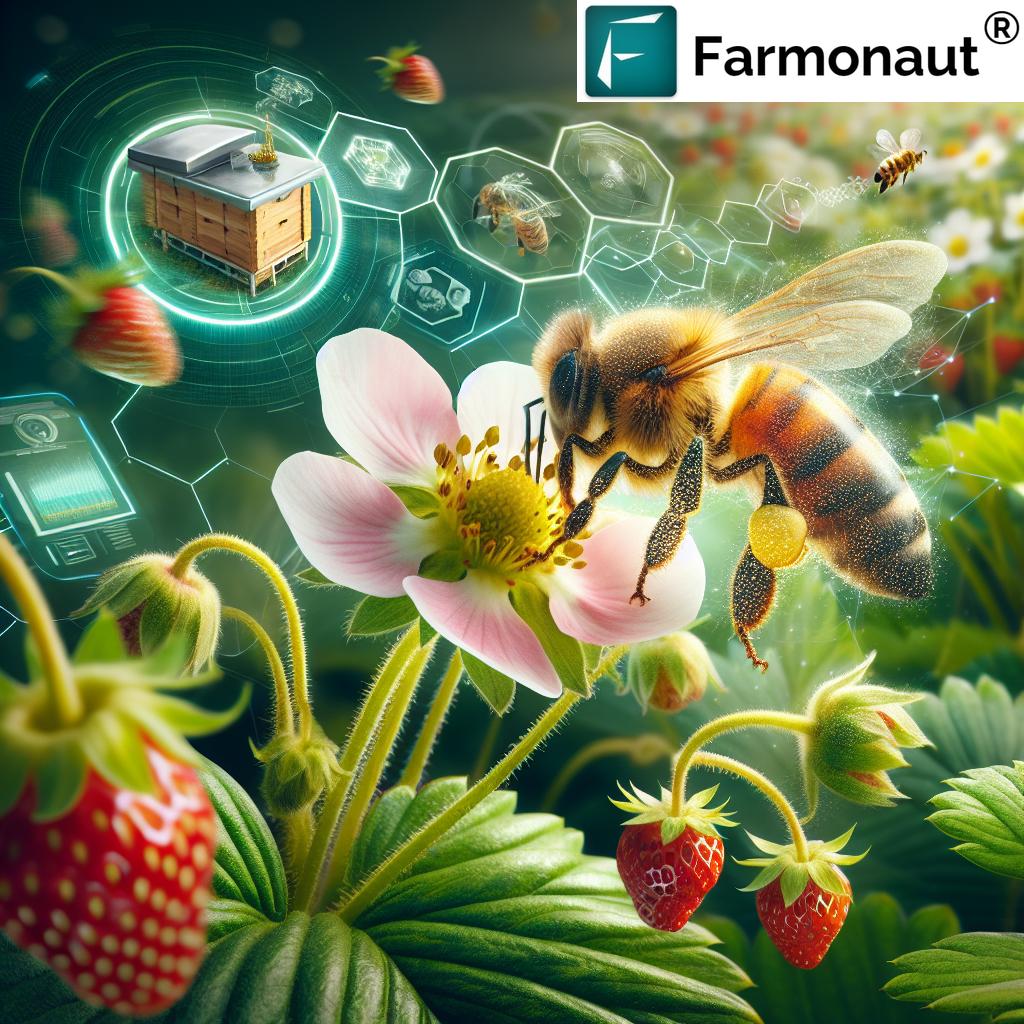Agricultural Testing Market Soars: Innovations in Soil Analysis and Food Safety Drive Global Growth to $11.6 Billion by 2031
“The global agricultural testing market is projected to reach a staggering $11.6 billion by 2031, driven by food safety demands.”
In an era where food safety and sustainable farming practices are paramount, the agricultural testing market is experiencing unprecedented growth. As we delve into this exciting landscape, we at Farmonaut recognize the pivotal role that agricultural technology innovations play in shaping the future of farming. Our commitment to providing cutting-edge precision agriculture solutions aligns perfectly with the industry’s trajectory towards more sophisticated and reliable testing methods.
The global agricultural testing market is on a remarkable upward trajectory, with projections indicating a surge to USD 11.60 billion by 2031. This growth is underpinned by a robust compound annual growth rate (CAGR) of 7.1% from 2024 to 2031, according to a comprehensive report released by SkyQuest on December 8, 2024. As we navigate this evolving landscape, it’s crucial to understand the driving forces behind this expansion and the implications for stakeholders across the agricultural sector.
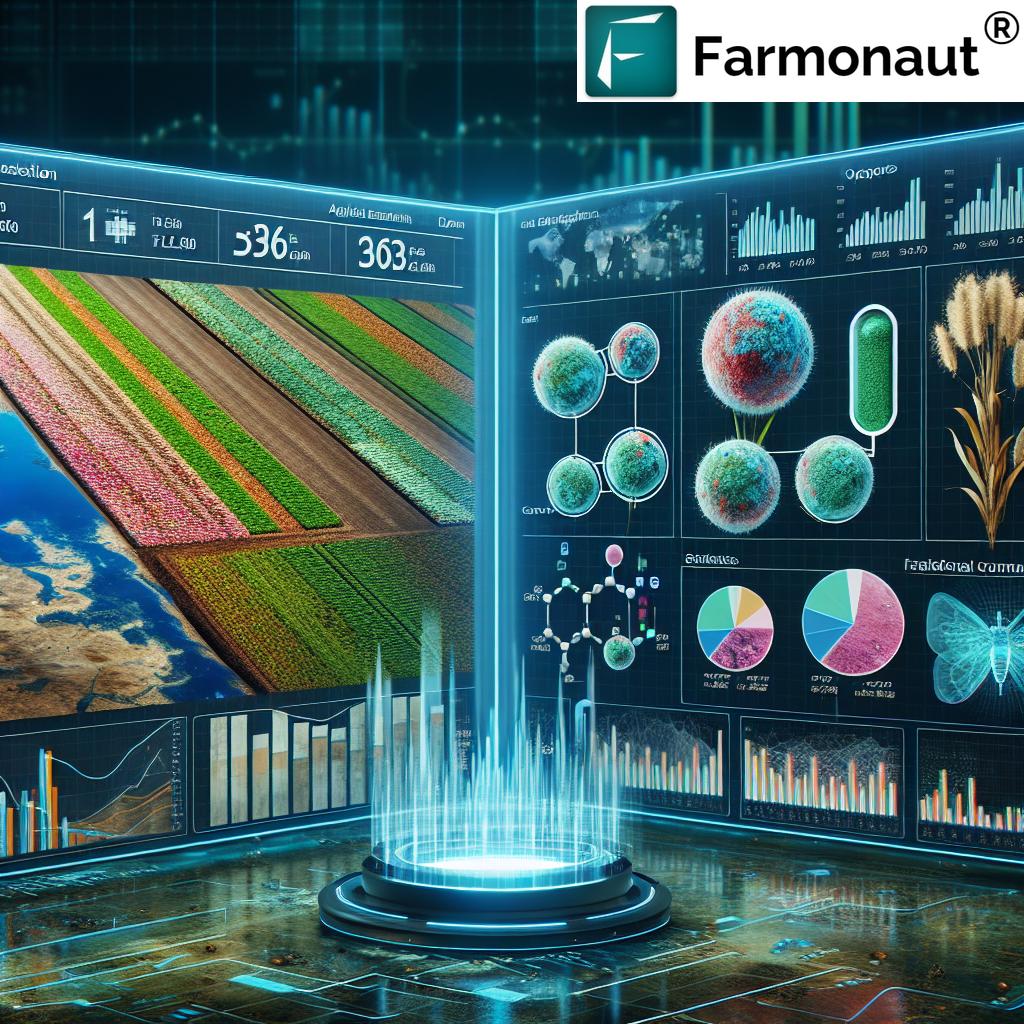
Key Drivers of Market Growth
Several factors are propelling the agricultural testing market forward:
- Growing Global Population: With the world’s population expected to reach 9.7 billion by 2050, the demand for food production is intensifying, necessitating more efficient and sustainable farming practices.
- Heightened Food Safety Concerns: Consumers and regulatory bodies are increasingly vigilant about food quality, driving the need for comprehensive testing to detect impurities, chemicals, heavy metals, and biological pathogens.
- Agricultural Product Quality Assurance: The emphasis on producing high-quality crops has never been stronger, leading to increased testing at various stages of production.
- Technological Advancements: Innovations in testing methods, including the integration of remote sensors, DNA assays, and rapid diagnostic techniques, are streamlining processes and improving result reliability.
As we witness these trends, it’s clear that the agricultural testing market is not just growing—it’s evolving. The current market revenue stands at approximately USD 6.7 billion, with expectations of accelerated growth driven by the proliferation of small testing laboratories and the adoption of sustainable practices within the food safety sector.
Market Segmentation and Dominance
The agricultural testing market is structurally segmented based on various factors:
- Sample Types
- Applications
- Technology
- Geography
Among these segments, soil testing currently dominates the market share. This dominance is primarily due to industrial growth causing environmental degradation, which necessitates extensive testing to evaluate soil fertility and nutrient content. At Farmonaut, we understand the critical importance of soil health in sustainable agriculture and offer advanced satellite-based solutions for soil analysis and monitoring.
The quality assurance segment also holds a significant market share, fueled by rising health concerns related to food quality and stringent regulations established by food safety authorities. Our precision agriculture solutions at Farmonaut contribute to this segment by providing real-time crop health monitoring and AI-based advisory systems that help ensure product quality from farm to table.
Regional Leadership and Emerging Opportunities
“North America currently leads the agricultural testing industry, with significant growth opportunities emerging in other global regions.”
North America stands at the forefront of the agricultural testing industry, with the United States playing a pivotal role. The region’s leadership is characterized by:
- A growing emphasis on seed testing certifications to enhance food safety standards
- The influential role of the Seed Regulatory and Testing Division (SRTD) in overseeing seed marketing and distribution
- Increasing cases of foodborne illnesses, as highlighted by the CDC, driving demand for comprehensive testing methodologies
While North America leads, we’re seeing exciting opportunities emerge in other regions. At Farmonaut, our global perspective allows us to contribute to the growth of precision agriculture and agricultural testing worldwide through our innovative satellite-based farm management solutions.
Technological Advancements Revolutionizing Agricultural Testing
The agricultural testing landscape is being transformed by cutting-edge technologies. These advancements are not only enhancing the efficiency of testing processes but also improving the accuracy and reliability of results. Some key technological innovations include:
- Remote Sensing: Satellite and drone-based imaging technologies are providing unprecedented insights into crop health and soil conditions. At Farmonaut, we leverage multispectral satellite images to monitor crop health, offering farmers valuable data on vegetation health (NDVI) and soil moisture levels.
- AI and Machine Learning: These technologies are enabling more sophisticated data analysis, leading to more accurate predictions and recommendations for farmers. Our Jeevn AI Advisory System is at the forefront of this revolution, delivering personalized farm advisory services based on real-time data analysis.
- Blockchain for Traceability: Blockchain technology is enhancing transparency and security in the agricultural supply chain. Farmonaut’s blockchain-based traceability solutions ensure that every stage of a product’s journey, from farm to consumer, is transparent and secure.
- Rapid Testing Kits: Portable and quick-result testing kits are making on-site testing more accessible and efficient for farmers and food producers.
- IoT Sensors: Internet of Things (IoT) devices are providing real-time data on various agricultural parameters, allowing for more timely and targeted testing.
These technological advancements are not only improving the agricultural testing process but also contributing to more sustainable and efficient farming practices overall.
Market Challenges and Opportunities
Despite the positive growth outlook, the agricultural testing market faces several challenges:
- Long Wait Times: Traditional testing methods can often lead to delayed results, impacting decision-making processes for farmers.
- High Testing Costs: The expense associated with comprehensive testing can be a significant burden for farmers, especially those operating on a smaller scale.
- Limited Awareness: There’s a need for increased education about the benefits of agricultural testing, particularly in developing regions.
However, these challenges also present opportunities for innovation and market growth. At Farmonaut, we’re addressing these issues through our affordable and accessible precision agriculture solutions. By providing real-time data and AI-driven insights, we’re helping to reduce the reliance on time-consuming and expensive traditional testing methods.
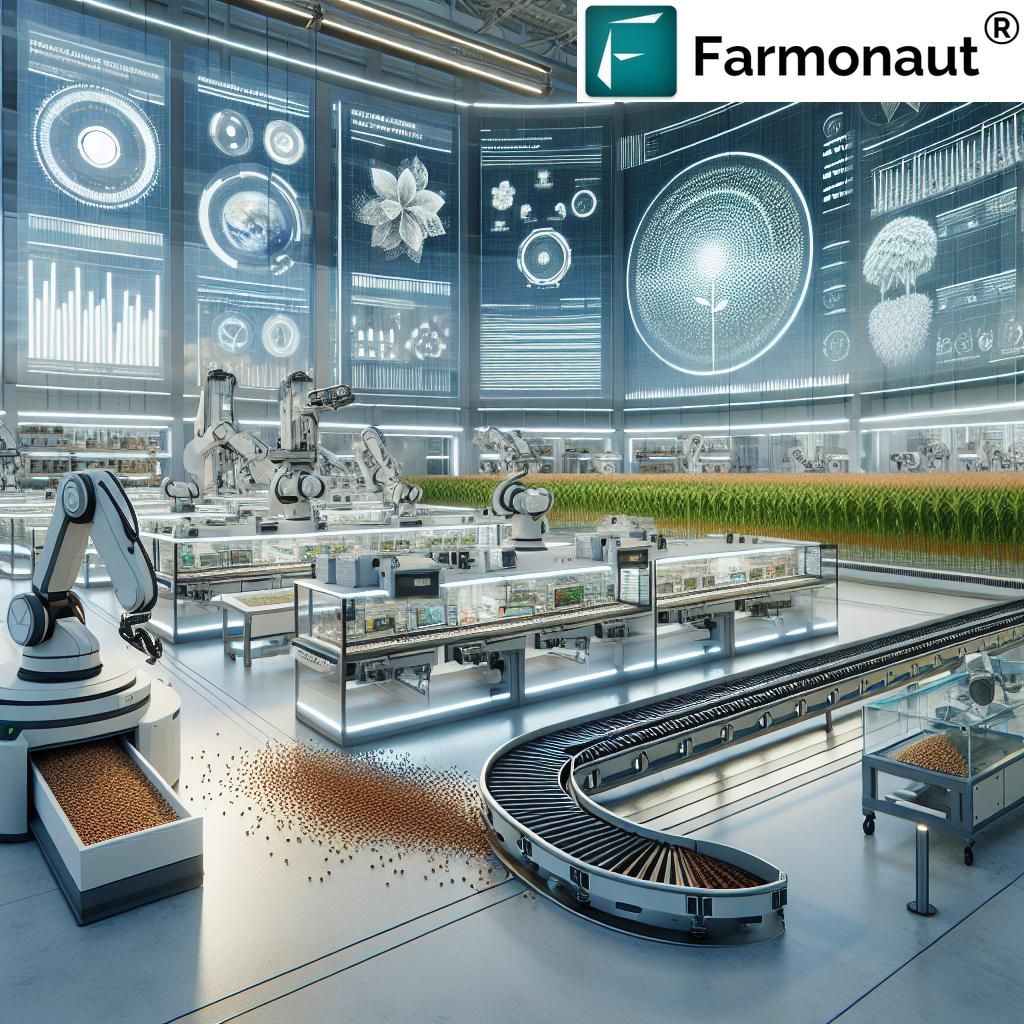
The Role of Regulatory Frameworks
Regulatory frameworks play a crucial role in shaping the agricultural testing market. As food safety concerns continue to rise, governments and international bodies are implementing stricter regulations and standards. This trend is expected to further drive the demand for agricultural testing services and technologies.
Key aspects of regulatory influence include:
- Mandatory testing requirements for food products
- Establishment of maximum residue limits for pesticides and other chemicals
- Certification processes for organic and non-GMO products
- International trade regulations requiring specific testing and documentation
These regulatory pressures create both challenges and opportunities for the agricultural sector. While compliance can be demanding, it also drives innovation and the adoption of more advanced testing methodologies.
The Impact of Sustainable Practices on Agricultural Testing
Sustainability is becoming increasingly important in agriculture, and this trend is significantly influencing the agricultural testing market. Sustainable farming practices require more frequent and comprehensive testing to ensure that they are effective and environmentally friendly. This includes:
- Soil Health Monitoring: Regular testing to maintain optimal soil conditions without over-reliance on chemical inputs.
- Water Quality Testing: Ensuring irrigation practices are sustainable and do not lead to water pollution.
- Carbon Footprint Assessment: Measuring and reducing the carbon footprint of agricultural operations.
- Biodiversity Impact Studies: Assessing the impact of farming practices on local ecosystems.
At Farmonaut, we’re proud to contribute to sustainable agriculture through our innovative solutions. Our satellite-based monitoring and AI-driven insights help farmers optimize resource use, reduce environmental impact, and maintain high crop quality standards.
Global Agricultural Testing Market Growth Projections
| Year | Projected Market Value (USD Billion) | North America Market Share (%) | Europe Market Share (%) | Asia-Pacific Market Share (%) | Rest of World Market Share (%) |
|---|---|---|---|---|---|
| 2023 | 6.7 | 35% | 28% | 25% | 12% |
| 2025 | 7.7 | 34% | 27% | 27% | 12% |
| 2028 | 9.4 | 33% | 26% | 29% | 12% |
| 2031 | 11.6 | 32% | 25% | 31% | 12% |
This table illustrates the projected growth of the global agricultural testing market from 2023 to 2031, highlighting the shift in regional market shares. While North America maintains its leadership, we can observe a gradual increase in the Asia-Pacific market share, reflecting the region’s growing importance in global agriculture.
The Future of Agricultural Testing: Trends to Watch
As we look towards the future of agricultural testing, several trends are emerging that will shape the industry:
- Increased Automation: The integration of robotics and AI in testing processes will lead to faster, more accurate results.
- Non-Invasive Testing Methods: Advancements in spectroscopy and imaging technologies will allow for more non-destructive testing options.
- Personalized Nutrition Testing: As consumer demand for personalized nutrition grows, testing for specific nutritional components in crops will become more prevalent.
- Integration with Big Data: The combination of testing data with other agricultural data sets will provide more comprehensive insights for farmers and food producers.
- Focus on Microbial Testing: With increasing awareness of the importance of soil microbiomes, there will be greater emphasis on testing for beneficial microorganisms.
At Farmonaut, we’re closely monitoring these trends and continuously evolving our precision agriculture solutions to meet the changing needs of the agricultural sector.
The Role of Precision Agriculture in Enhancing Agricultural Testing
Precision agriculture is playing an increasingly crucial role in the evolution of agricultural testing. By leveraging advanced technologies such as satellite imaging, IoT sensors, and AI-driven analytics, precision agriculture is revolutionizing how we approach crop management and testing. Here’s how precision agriculture is enhancing agricultural testing:
- Real-Time Monitoring: Precision agriculture tools allow for continuous monitoring of crop health and soil conditions, enabling more timely and targeted testing.
- Data-Driven Decision Making: By providing comprehensive data on various agricultural parameters, precision agriculture helps farmers and agronomists make more informed decisions about when and where to conduct tests.
- Predictive Analytics: Advanced algorithms can predict potential issues before they become visible, allowing for preemptive testing and intervention.
- Resource Optimization: By identifying specific areas that require attention, precision agriculture helps optimize the use of testing resources, making the process more efficient and cost-effective.
- Integration of Multiple Data Sources: Precision agriculture platforms can integrate data from various sources, including satellite imagery, weather forecasts, and on-ground sensors, providing a more holistic view for testing purposes.
At Farmonaut, we’re at the forefront of this integration between precision agriculture and agricultural testing. Our satellite-based farm management solutions provide valuable insights that complement and enhance traditional testing methods, contributing to more sustainable and productive farming practices.
For those interested in leveraging these advanced technologies, we invite you to explore our solutions:

For developers looking to integrate our satellite and weather data into their own systems, check out our API and API Developer Docs.
Our mobile apps are also available for on-the-go access to critical farm data:


The Importance of Continuous Innovation in Agricultural Testing
As the agricultural testing market continues to grow and evolve, the importance of continuous innovation cannot be overstated. Innovation drives improvements in testing accuracy, efficiency, and accessibility, which are crucial for addressing the challenges facing modern agriculture. Key areas of innovation include:
- Nanotechnology: The development of nanosensors and nanoparticles for ultra-sensitive detection of contaminants and pathogens.
- Gene Editing: Utilizing CRISPR and other gene-editing technologies to develop crops with enhanced traits that can be more easily tested and verified.
- Artificial Intelligence and Machine Learning: Advancing the capabilities of data analysis and predictive modeling in agricultural testing.
- Drone Technology: Enhancing the capabilities of aerial imaging and sampling for large-scale agricultural operations.
- Blockchain Integration: Improving traceability and transparency in the testing and certification process.
At Farmonaut, we’re committed to driving innovation in the agricultural sector. Our continuous efforts to enhance our satellite-based solutions and AI-driven insights contribute to the broader innovation landscape in agricultural testing and precision farming.
Addressing Global Food Security Through Advanced Agricultural Testing
The growth of the agricultural testing market has significant implications for global food security. As the world population continues to grow and climate change impacts agricultural productivity, ensuring food safety and quality becomes increasingly critical. Advanced agricultural testing plays a vital role in this by:
- Improving crop yields through better soil and crop health management
- Ensuring food safety by detecting contaminants and pathogens
- Enhancing nutritional quality through targeted crop improvement
- Reducing food waste by improving storage and transportation practices
- Supporting sustainable farming practices that protect long-term food production capacity
By providing farmers and food producers with accurate, timely data, agricultural testing empowers them to make informed decisions that contribute to global food security. At Farmonaut, we’re proud to be part of this crucial effort through our precision agriculture solutions that support sustainable and productive farming practices worldwide.
Farmonaut Subscriptions
Frequently Asked Questions (FAQ)
Q1: What is driving the growth of the agricultural testing market?
A1: The market growth is primarily driven by increasing global population, heightened food safety concerns, the need for agricultural product quality assurance, and technological advancements in testing methods.
Q2: How is technology impacting agricultural testing?
A2: Technology is revolutionizing agricultural testing through innovations like remote sensing, AI and machine learning, blockchain for traceability, rapid testing kits, and IoT sensors, leading to more efficient and accurate testing processes.
Q3: What role does precision agriculture play in agricultural testing?
A3: Precision agriculture enhances agricultural testing by providing real-time monitoring, enabling data-driven decision making, offering predictive analytics, optimizing resource use, and integrating multiple data sources for more comprehensive insights.
Q4: How does agricultural testing contribute to global food security?
A4: Agricultural testing contributes to global food security by improving crop yields, ensuring food safety, enhancing nutritional quality, reducing food waste, and supporting sustainable farming practices.
Q5: What are the main challenges facing the agricultural testing market?
A5: The main challenges include long wait times for test results, high testing costs that can burden farmers, and limited awareness about the benefits of testing, especially in developing regions.
Conclusion
The agricultural testing market is poised for significant growth, driven by technological innovations, increasing food safety concerns, and the global push for sustainable farming practices. As we progress towards 2031, the projected market value of USD 11.60 billion reflects the critical importance of agricultural testing in ensuring food security and quality for a growing world population.
At Farmonaut, we’re committed to contributing to this growth through our advanced precision agriculture solutions. By leveraging satellite technology, AI, and data analytics, we’re helping farmers and agricultural stakeholders make informed decisions that optimize crop yields, ensure food safety, and promote sustainable farming practices.
As the industry continues to evolve, the integration of cutting-edge technologies and the adoption of more comprehensive testing methodologies will be crucial. The challenges of cost, time, and awareness present opportunities for innovation and market expansion, particularly in emerging regions.
The future of agricultural testing is bright, with potential for significant advancements in areas such as non-invasive testing methods, personalized nutrition testing, and the integration of big data analytics. These developments will not only drive market growth but also contribute to addressing global challenges in food production and environmental sustainability.
We invite stakeholders across the agricultural sector to embrace these innovations and join us in shaping a more sustainable and productive future for agriculture. Together, we can leverage the power of advanced agricultural testing and precision farming to ensure food security, improve crop quality, and protect our planet’s resources for generations to come.



